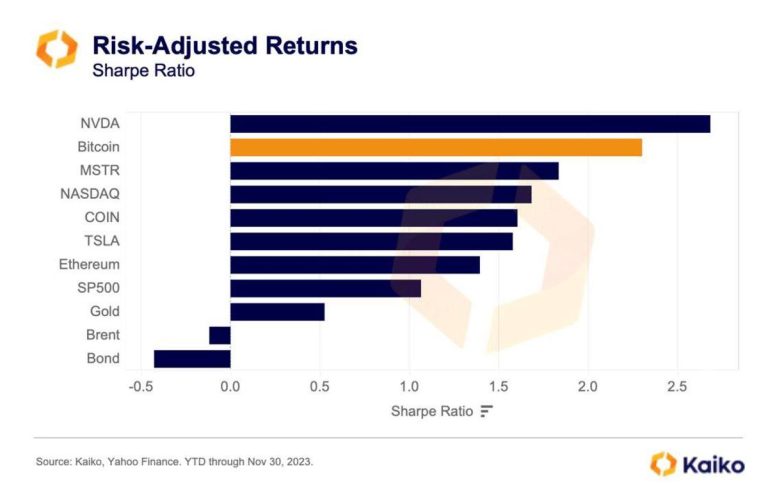Amidst a sea of change in the cryptocurrency market, the investment game is undergoing a seismic shift. Spot Bitcoin ETFs already exist, marking Bitcoin's leap into mainstream finance and bringing it closer to traditional investment fabrics. We will look at the tip of the iceberg trying to imagine its true depth as well as the current relationship between Bitcoin, stocks and gold. We will try to find out if the traditional market is really driving Bitcoin out of its decentralized niche, or if there is still room for hope that it can maintain its unique path.
According to Caico data, Bitcoin's risk-adjusted returns were higher than traditional assets. Nvidia led with the highest returns on a risk-adjusted basis, while Bitcoin fell impressively, outpacing major traditional assets such as the S&P 500, and gold, with its value rising more than 160% in risk-adjusted terms.

Meanwhile, according to the IMF Crypto Cycle and US Monetary Policy Study, 80% of the variation in cryptocurrency prices and their increasing correlation with stock markets coincided with the entry of institutional investors into cryptocurrency markets since 2020. In particular, the trading volume of Before Institutions on Cryptocurrencies Exchanges grew by more than 1,700% (from about $25 billion to more than $450 billion) during the second quarter of 2020 and the second quarter of 2021. According to the study, US monetary policy affects the cryptocurrency cycle, exactly Like global stock cycles but surprisingly, it is only the US Federal Reserve's monetary policy that matters, not other major central banks – perhaps because cryptocurrency markets are highly dependent on the US dollar.
Furthermore, the 2023 Institutional Investors Digital Asset Outlook Survey indicates that 64% of investors are prepared to increase their stakes in the cryptocurrency space within three years, allocating up to 5% of assets under management to cryptocurrencies. She said that a number of institutions made investments for the first time during the past year, while other institutions increased their current investments. While the study highlights an increase in commitment to cryptocurrencies from 41% of asset managers, only 27% of asset owners appear to be increasing their stakes.
Although Bitcoin was born from the idea of evenly distributing power, recent studies suggest that it has slowly become dominated by a select group of large players.
Change the dynamics of the association
Interestingly, Bitcoin moves in tandem with the S&P 500 and Nasdaq, with an impressive correlation. Meanwhile, the correlation between Bitcoin and gold has fallen sharply recently, in contrast to claims that investors view cryptocurrencies as a safe haven or hedge against inflation, a role traditionally played by gold.

Notably, Bitcoin's correlation with gold was positive at 0.83 on November 7, 2023, but fell to -0.1 on January 10, 2024, before recovering to a marginally higher positive level of 0.14 on February 9, 2024. The S&P 500 saw a negative correlation of -0.76 on November 11, 2023, and then reached a positive correlation of 0.57 in January 2024. This has shifted from negative to positive correlation points to the changing perception of Bitcoin among investors.
The Nasdaq Composite Index, known for technology and growth stocks, also showed a variable correlation with Bitcoin. The negative correlation, which was -0.69 on October 30, 2023, turned to positive 0.44 in January. Traders appear to be linking Bitcoin's rhythm to the pulse of the technology sector, suggesting a new relationship in investment strategies.
When the correlation between Bitcoin and traditional stock markets like the S&P 500 and Nasdaq increases, while its correlation with gold decreases, it indicates that Bitcoin is behaving like a high-risk asset rather than a safe haven. When investors feel adventurous, they often turn to stocks and cryptocurrencies for the opportunity to make greater profits.
If institutional and retail investors become increasingly involved in equity and cryptocurrency markets, their simultaneous decisions to buy and sell may lead to the price movements of these assets being aligned.
Bitcoin ETFs getting the green light appear to be increasing their magic for big investors, with a large portion already planning to step up their Bitcoin game. Bitcoin's move into ETFs could make them behave more like stocks since these ETFs are big players in the stock world.
In the midst of these developments, the essence of Bitcoin and other cryptocurrencies, freed from the constraints of traditional financial systems, could be undermined. Moreover, these shifts could expose Bitcoin to the very systemic risks it was designed to escape.
Concluding thoughts
As we look at how Bitcoin ETFs could shake up Bitcoin's market role and its current correlation with stocks, we need to keep a keen eye on balancing our excitement for more big players jumping in and potential growth while staying true to the essence of Bitcoin. The principle of non-central control. Bitcoin's move toward a more centralized investment landscape may move the market, offering bright opportunities, but also facing difficult challenges.
This is a guest post by Maria Carolla. The opinions expressed are entirely their own and do not necessarily reflect the opinions of BTC Inc or Bitcoin Magazine.

